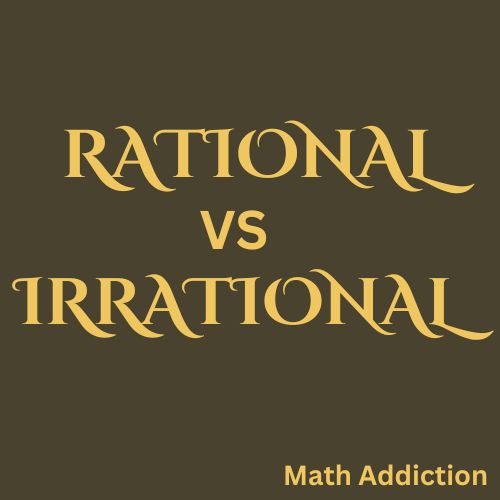Pi (π) is a mathematical constant that represents the ratio of a circle’s circumference to its diameter. The question of whether pi (π) is a rational or irrational number has intrigued mathematicians for centuries. Rational numbers can be expressed as fractions, while irrational numbers cannot. Pi (π), however, is an irrational number, meaning it cannot be expressed as a simple fraction. Its decimal representation is infinite and non-repeating, making it impossible to write it down exactly. This fundamental property of pi (π) has significant implications in various fields of mathematics and is still a subject of ongoing research and exploration.

Table of Contents
What is Rational Number?
A rational number is any number that can be written as a fraction, where both the numerator (the top number) and the denominator (the bottom number) are integers, and the denominator is not equal to zero. in other words, rational numbers are those numbers that can be written as a fraction of two numbers, where the denominator is not equal to zero.
Properties of Rational Number
- Rational numbers can be represented as either terminating decimals (e.g. 0.25) or repeating decimals (e.g. 0.3333…).
- Rational numbers have equivalent fractions. For example, 1/2 and 2/4 represent the same rational number.
- Rational numbers can be ordered on a number line. They can be compared using the less than or greater than symbols.
- Between any two rational numbers, there exists another rational number. This property is called density.
What is Irrational Number?
Irrational numbers are real numbers that cannot be represented as simple fractions. An irrational number cannot be expressed as a ratio, such as p/q, where p and q are integers, and q is not equal to zero. In other words, Irrational numbers are those numbers that cannot be written as a fraction of two numbers.
Properties of Irrational Number
- Irrational numbers cannot be expressed as a ratio of two integers, meaning they cannot be represented as fractions. They have non-repeating and non-terminating decimal expansions.
- The value of the square root of any prime number is an irrational number.
- An irrational number is always a real number.
- The set of irrational numbers is uncountably infinite, meaning its cardinality is greater than that of the set of natural numbers.
Is Pi (π) a Rational or Irrational Number?
Pi (π) is an irrational number because rational numbers are those numbers that can be written as a fraction of two integers. On the other hand, irrational numbers are those numbers that cannot be written as a fraction of two integers.
The value of Pi (π) is approximately equals 3.141592653……., and is a non-terminating and non-repeating decimal number that cannot be written as a fraction. Hence, “Pi (π)” is an irrational number.
Proof that Pi (π) is Irrational
Assume Pi (π) is rational, meaning it can be expressed as a fraction a/b, where a and b are integers with no common factors other than 1.
Let’s take a= 22 and b= 7, these are integers with no common factors other than 1.
Now, Pi (π) = 22/7
However, the true value of Pi (π) is approximately 3.14159…., which is not exactly equal to 22/7.
Therefore, our assumption that Pi (π) can be expressed as a rational number is false, proving that Pi (π) is irrational.
Why is Pi (π) Irrational and 22/ 7 Rational?
Pi (π) is irrational because it cannot be expressed as a simple fraction of two integers. It is a transcendental number, meaning it is not the root of any non-zero polynomial equation with rational coefficients.
On the other hand, 22/7 is a rational approximation of P (π). It’s close to Pi (π), but not exactly equal to it. Rational numbers are those that can be expressed as the ratio of two integers, which 22/7 is.
Recommended Reading
All About Number System in Math
Practice Questions
Q1 Why pi (π) is an irrational number?
Q2 What is the difference between rational and irrational number?
Q3 What is rational number?
Frequently Asked Questions
Q1 What is rational Number?
Rational numbers are those numbers that can be written as a fraction of two integers where denominator of the fraction is not zero.
Q2 What are irrational number?
Irrational numbers are those numbers that cannot be written as a fraction of two integers.
Q3 Why pi (π) is an irrational number?
Pi is irrational number because it cannot be expressed as the ratio of two integers.
Q4 Give 5 examples of rational number.
The 5 examples are ½, 0, -7, 5, ¼.
Q5 What are 5 examples of irrational number?
The 5 examples are pi (π), Euler’s number (e), √2, √3, √5.
Q6 What is Pi(π)?
Pi (π) is the ratio of the circumference of a circle to its diameter. It is a mathematical constant and is approximately equal to 3.14159.
Q7 How many digits of pi (π) have been calculated?
As of the latest records, trillions of digits of pi (π) have been calculated using various mathematical algorithms and computer systems. However, for most practical purposes, a few dozen decimals places of pi (π) are sufficient.
Q8 Why is pi (π) important?
Pi (π) is essential in geometry, trigonometry, calculus, physics, and many other branches of mathematics and science.
Q9 Can pi (π) be represented exactly?
No, pi (π) cannot be represented exactly using any finite sequence of digits or a simple fraction.
Q10 Are there any patterns in the digits of pi (π)?
While there is no discernible pattern in the digits of pi (π), it is a normal number, which means that its digits are uniformly distributed and do not exhibit any predictable sequence or repetition.
